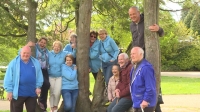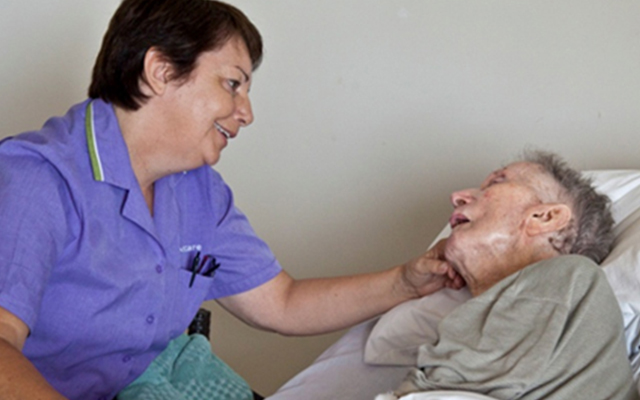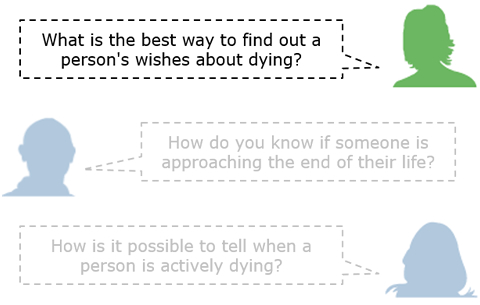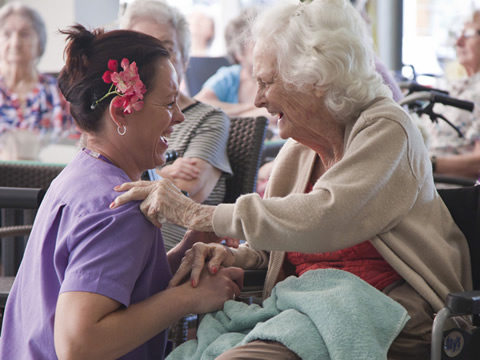Enabling People to Live Well with Dementia | End of Life Dementia Care



This session will explore how to ensure high quality, compassionate and coordinated end of life care for people with dementia, meeting their physical and psychological needs and also paying attention to the needs of their families.
Learning Objectives
By the end of this session you will be able to:
- Ensure the person's wishes and preferences for end of life are known
- Recognise when someone is in their last days or weeks of life
- Meet the psychosocial needs of people with dementia at the end of life
- Meet the person's physical and medical needs at end of life, including pain assessment and treatment
- Recognise the diverse needs of people living with dementia at end of life due to age and cultural and religious differences
- Support the needs of family carers, including bereavement
- Support care staff
In this session we will look at how to ensure high quality compassionate and coordinated end of life care for people with dementia including the role of advanced care planning; identifying and addressing end of life physical symptoms including identifying and treating pain; meeting psychosocial needs; and supporting and meeting needs of families.
This session has been mapped to the Dementia Training Standards Framework and is designed to support the Dementia Action Alliance Dementia Statement.
Before commencing this session you should:
- Complete Module 1 - Introduction to Living with Dementia/Dementia Awareness (407-0030)
Murna is a Professor in Dementia Studies at the Centre for Applied Dementia Studies at the University of Bradford. Her research interests focus on improving quality of life and quality of care for people with dementia and their families. Recent research includes approaches to improving transitions in dementia care; improving health care for nursing home residents; promoting independence for people living with dementia in the community; and the effectiveness of the University's practice development methodology, Dementia Care Mapping, in implementing person-centred care in care homes.
Murna has published on a range of topics including the perspective of the person with dementia, early diagnosis, long term care, end of life and transitions in dementia care. She is co-editor of the textbook 'Excellence in dementia care: Research into practice' and is series editor of the University of Bradford Jessica Kingsley Good Practice Guides on Dementia Care. She is an ambassador for the Alzheimer's Society, serves on the Research Advisory Council of the Alzheimer's Society, is an adviser to Alzheimer Europe, and is a member of the National Institute for Health Research Portfolio Development Group for the Dementia and Neurodegenerative Diseases Research Network (DeNDRoN). She was recently awarded an outstanding achievement award by the British Society of Gerontololgy.


Lindsey is a Senior Dementia Care Practice Development Consultant and Trainer within the Centre for Applied Dementia Studies at the University of Bradford. Her role involves developing and delivering face-to-face and cascade training to health and social care organisations throughout the UK and internationally. Lindsey leads the delivery of training in Dementia Care Mapping for Realising Person Centred Care; Dementia Care Mapping for Leading Practice Change; and the Short Observational Framework for Inspection, which is used by health and social care inspectors internationally.
Her areas of special interest include promoting effective and meaningful person-centred communication and supporting people living with dementia who experience complex eating and drinking difficulties, particularly at the end of life. Lindsey is an Alzheimer's Society Clinical Training Fellow conducting a PhD to explore the eating and drinking experiences of people living with dementia and swallowing difficulties in care homes. She completed her MSc in Dementia Studies in 2012 and joined the Centre for Applied Dementia Studies at the University of Bradford in October 2013.
A registered speech and language therapist she has worked in a variety of settings, including acute hospitals, mental health hospitals, care homes, day centres and in people's own homes. She has been responsible for developing and embedding specialist speech and language therapy services within several NHS Mental Health Trusts in England. Since 2006, Lindsey has specialised in dementia care practice. Lindsey maintains strong links with the field of speech and language therapy to maintain her clinical knowledge and skills. She is regularly invited to give keynote lectures.
Clare is a Dementia Care Trainer in person-centred care at the Centre for Applied Dementia Studies at the University of Bradford. She is responsible for Patient and Public Involvement (PPI) in the Centre. Clare is currently enrolled on a Master's in Advanced Dementia Studies at the University of Bradford and holds BSc (Hons) in dementia studies. In 2018, Clare was awarded the Dr Trevor Jarvis Award for commitment to adult learning.
Clare has worked within the private, statutory, health and third sectors with people with dementia for over 25 years, including for the Alzheimer's Society as a Dementia Support Manager and Trainer. Clare is a volunteer leader for Pathways young onset dementia support group running monthly support group meetings, social activities and an annual supported holiday. Clare's interests are young onset dementia, dementia and sight loss, and patient and public involvement in dementia.



- Step to Work | Systems that shape everyday practic...
- Posted By eIntegrity Healthcare e-Learning
- Posted Date: 2024-12-23
- Location:Online
- This session looks at how the everyday practice of allied health professionals is part of, and shaped by, complex systems.
- Step to Work | Sustaining change and learning
- Posted By eIntegrity Healthcare e-Learning
- Posted Date: 2024-12-23
- Location:Online
- In this session, we will help you begin to draw together some of your reflections and learning from the Step to Work programme. We will be drawing on some ideas from positive psychology to help you do this.
- Step to Work | Positive appraisal of learning duri...
- Posted By eIntegrity Healthcare e-Learning
- Posted Date: 2024-12-23
- Location:Online
- This session focuses on appraising your experiences in service settings to help you surface and understand the thoughts and feelings1 about difficult and challenging situations you have experienced. It will also help you to better appreciate your own stre
- Step to Work | Personal wellbeing at work
- Posted By eIntegrity Healthcare e-Learning
- Posted Date: 2024-12-23
- Location:Online
- This session explores how we can use self-care practices to help overcome the negative impacts that challenging days at work have on us and promote health and wellbeing.
- Step to Work | Introduction to the sessions in the...
- Posted By eIntegrity Healthcare e-Learning
- Posted Date: 2024-12-23
- Location:Online
- Introdcution to the sessions in the Step to Work programmme.





